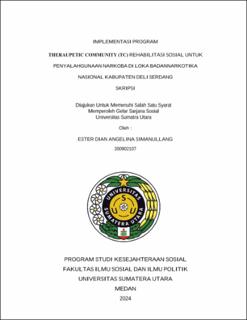Implementasi Program Theraupetic Community (TC) Rehabilitasi Sosial untuk Penyalahgunaan Narkoba di Loka Badan Narkotika Nasional Kabupaten Deli Serdang
Implementation of the Therapeutic Community (TC) Social Rehabilitation Program for Drug Abuse at the National Narcotics Agency (BNN) Loka in Deli Serdang Regency

Date
2024Author
Simanullang, Ester Dian Angelina
Advisor(s)
Ritonga, Fajar Utama
Metadata
Show full item recordAbstract
The National Narcotics Agency (BNN), persistently striving to prevent and eradicate drug-related criminal cases, focuses its efforts on rehabilitation through the implementation of Therapeutic Community (TC) models. The Loka BNN of Deli Serdang Regency prioritizes the therapeutic community approach as a key strategy in reducing the number of drug users. A therapeutic community is a group of individuals facing similar challenges who come together to support each other in overcoming their struggles. This approach allows for a comprehensive understanding of the subject of study, including its characteristics, nature, and model. Therefore, qualitative research methods are employed in this study to examine the rehabilitation process using the therapeutic community model at the Loka BNN of Deli Serdang Regency, including the process and outcomes of rehabilitation.
The study aims to evaluate the implementation of the social rehabilitation program for drug abusers at the Loka National Narcotics Agency (BNN) of Deli Serdang Regency. The program emphasizes the development of social skills and the enhancement of individual capacities to enable them to reintegrate into society free from drug dependency. The implementation of the Therapeutic Community (TC) program at the Loka National Narcotics Agency (BNN) of Deli Serdang encompasses organization, interpretation or understanding, and application. Each stage is designed to restore the physical, mental, and social well-being of drug abusers, supported by a peer community that plays a crucial role in the rehabilitation process.The data analysis revealed that the success of this program largely depends on the active participation of residents in rehabilitation activities and the support of their families and communities. The study recommends increasing public awareness about the importance of social rehabilitation and providing sustainable support for former drug abusers to help them reintegrate effectively into society.
Collections
- Undergraduate Theses [1170]
